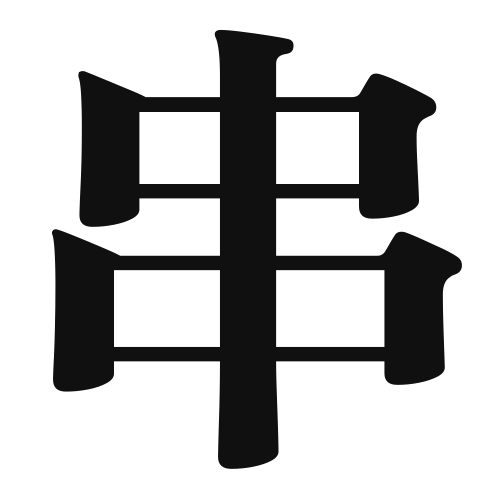1. Overview of Meaning
The kanji “串” (kushi) primarily means “skewer” or “stick.” It refers to a thin, pointed object used to hold pieces of food together, often seen in various culinary dishes, especially in Japanese cuisine.
2. Formation and Radical
Formation of the Kanji: The kanji “串” is a phono-semantic compound (形声文字), which combines a phonetic component and a semantic component. The left part, “木” (tree), suggests a connection to wood, while the right part, “九” (nine), contributes to the pronunciation.
Radical: The radical of “串” is “木” (tree), indicating its association with wooden objects.
3. Examples of Usage
Common Words and Phrases:
- 焼き串 (yaki-kushi) – grilled skewer
- 串焼き (kushi-yaki) – skewered and grilled food
Example Sentences in Daily Conversation:
- 今夜、焼き串を作ります。 (Kon’ya, yaki-kushi o tsukurimasu.) – I will make grilled skewers tonight.
- この串焼きはとても美味しいです。 (Kono kushi-yaki wa totemo oishii desu.) – This skewered dish is very delicious.
4. Synonyms and Antonyms
Similar Kanji:
- 棒 (bō) – stick; while both refer to long, thin objects, “棒” is more general and can refer to any stick, whereas “串” specifically refers to a skewer used for food.
Antonyms:
- 塊 (katamari) – lump; this refers to a solid mass, contrasting with the thin, elongated shape of “串.”
5. Cultural and Historical Background
Connection to Japanese Culture: “串” is significant in Japanese cuisine, especially in dishes like yakitori (grilled chicken skewers) and kushi-katsu (deep-fried skewers). These dishes are popular in izakayas (Japanese pubs).
Proverbs and Idioms: There are no widely known proverbs specifically featuring “串,” but it is often associated with communal dining experiences, emphasizing sharing and togetherness in Japanese culture.
